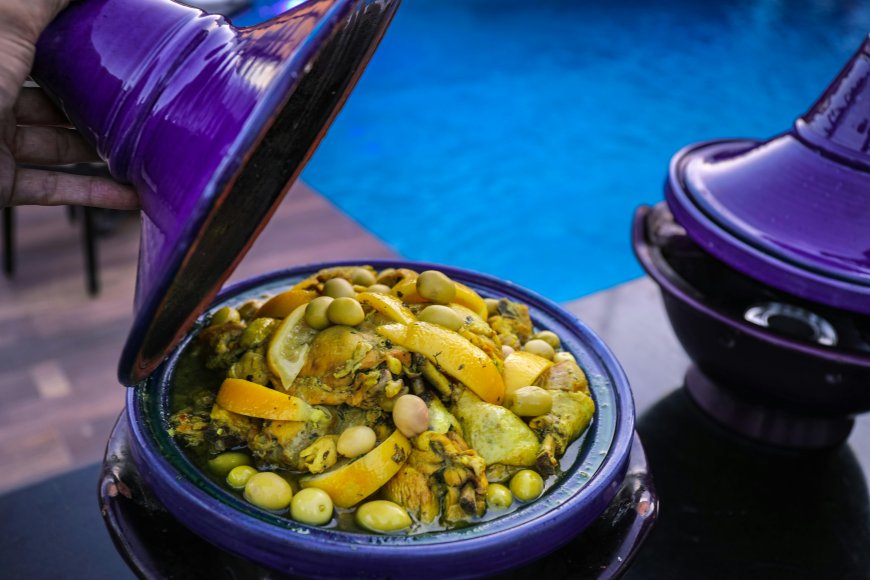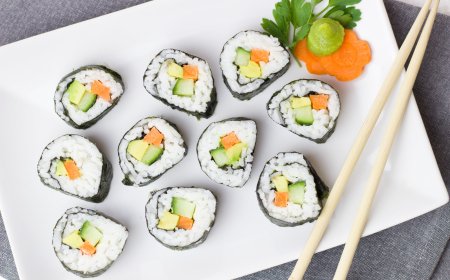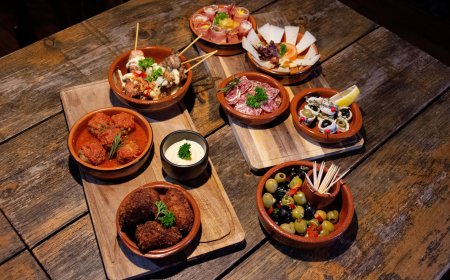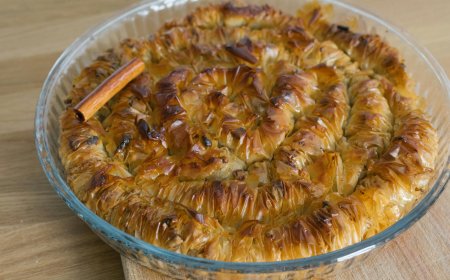The most famous traditional Moroccan dishes
Traditional Moroccan dishes are considered among the most prominent elements that distinguish Moroccan cuisine for its diversity and richness in flavors, featuring distinctive local ingredients.

Traditional Moroccan dishes are considered among the most prominent elements that distinguish Moroccan cuisine for its diversity and richness in flavors, featuring distinctive local ingredients.
The most famous traditional Moroccan dishes
Exploring the diversity of cuisines in Moroccan cuisine represents an exciting journey into the world of flavors and unique culinary heritage of this beautiful country. Moroccan cuisine is characterized by its great diversity and richness in natural ingredients and unique spices that give dishes an irresistible taste. The Moroccan cuisine is famous for its variety of main dishes such as tagine, couscous, harira, grilled dishes, and many more.
The variety of Moroccan cuisine is influenced by traditions, heritage, and the diverse geographical environment of the country, combining fresh seafood from the coasts, rich vegetables from fertile lands, and diverse meats from sheep, cattle, and poultry. Unique spices such as cumin, saffron, coriander, and ginger add a special flavor to each dish.
Thanks to this culinary diversity, explorers can enjoy tasting a wide range of dishes in Moroccan cuisine, from rich main courses with meat and vegetables to delicious desserts such as basbousa, shebakia, and various pastries.
Furthermore, food in Morocco is usually seen as an opportunity for social interaction and solidarity, where people enjoy meals together in an atmosphere of warmth and hospitality. Thanks to this rich food culture and the great variety of dishes, exploring the diversity of cuisines in Moroccan cuisine is an enjoyable and sensory experience that leaves a deep impression on explorers' memories.
Discover the secrets of preparing traditional Moroccan cuisine dishes
Discovering the secrets of preparing traditional Moroccan cuisine dishes means delving into a world of unique flavors and traditions that characterize this wonderful cuisine. Moroccan cuisine is known for its great diversity and the use of a variety of natural ingredients and unique spices that give dishes an irresistible taste. But behind this delicious diversity lie many secrets that make Moroccan cuisine dishes distinctive and delicious.
One of the key secrets in preparing Moroccan cuisine dishes is using spices correctly according to the original recipe. These spices include a variety of seasonings such as saffron, cumin, ginger, and coriander, which add a unique and deep flavor to each dish.
Secrets also lie in the traditional cooking techniques used in Moroccan cuisine, such as cooking tagine over charcoal, steaming couscous, and baking harira in the oven. These techniques not only add unique flavor to the dishes but also help preserve the nutritional values of the ingredients.
Additionally, secrets also extend to using natural and fresh ingredients that are essential in Moroccan cuisine, such as olives, almonds, fresh meats, and seasonal vegetables.
Understanding these secrets and applying them helps in preparing Moroccan cuisine dishes correctly and authentically, allowing people to experience wonderful flavors and enjoy a distinctive and sensory cooking experience in their homes.
Experience the sweetness and heritage
Indulging in sweetness and heritage in Moroccan cuisine means enjoying a unique experience of traditional Moroccan desserts and discovering the rich culinary culture and heritage of this country. Desserts are an integral part of Moroccan cuisine, distinguished by their diversity and richness in natural ingredients and unique spices that reflect the country's heritage and diverse culture.
Moroccan cuisine is renowned for offering a variety of delicious desserts, such as basbousa, shebakia, ghriba, and various pastries like baghrir and rghaif. These desserts showcase the rich and diverse flavors of Moroccan cuisine, characterized by traditional preparation methods that transport us to a world of memories and heritage.
In addition to their wonderful flavors, desserts in Moroccan cuisine carry cultural and traditional symbols, being an integral part of special occasions, religious celebrations, and social gatherings. For example, shebakia is considered one of the most important desserts served during the Eid al-Fitr festival in Morocco.
Tasting the sweetness and heritage in Moroccan cuisine offers an exciting experience to discover the culture, history, and traditions through delightful flavors and delicious desserts that carry a unique imprint of this enchanting country.
An unforgettable journey of flavors
An unforgettable journey of flavors in Moroccan cuisine means exploring the diversity of flavors and unique dishes that characterize this wonderful culinary culture. Morocco is one of the foremost culinary destinations in the world, where ancient cooking traditions meet fresh natural ingredients to create unforgettable dining experiences.
This tasting journey begins with sampling main dishes such as tagine, which is considered a symbol of Moroccan cuisine and consists of a unique blend of meats, vegetables, fruits, and rich spices. It is followed by the couscous experience, one of the most famous traditional Moroccan dishes characterized by its unique steaming cooking method.
The journey is incomplete without tasting delicious Moroccan desserts such as basbousa, shebakia, and ghriba, which vary in taste and reflect the rich story of Moroccan cuisine. Travelers can also experience popular foods in markets and local restaurants, where they can explore the variety of cuisines and converse with local people to understand the history and culture of Moroccan cuisine more deeply.
A journey of flavors in Moroccan cuisine is an enjoyable and sensory experience, allowing travelers to enjoy delicious food, discover local culture, and taste unforgettable flavors that carry a unique imprint of this enchanting country.
Street food in Morocco
Street food in Morocco is an important part of the culinary experience in this country, reflecting a great diversity in cuisines and offering visitors the opportunity to taste delicious dishes at reasonable prices and with irresistible flavors. Street food in Morocco is available in traditional markets and along the main streets in both large and small cities.
Moroccan street food includes a variety of foods, ranging from main dishes like couscous and tagine, prepared quickly and offered at reasonable prices to customers, to appetizers like hummus, falafel, and grilled pastries.
Desserts are also an important part of Moroccan street food, where visitors can enjoy tasting sweet pastries like baghrir and rghaif, as well as local chilled beverages like mint tea and fresh orange juice.
Moroccan street food is not only an opportunity to taste delicious food but also to immerse oneself in the local culture and interact with local people. Sitting in a popular café for breakfast with locals is an exciting experience and provides an opportunity to talk to them and share experiences.
In this way, street food in Morocco is a fun and fascinating experience to discover the culture and heritage of Moroccan cuisine and enjoy tasting delicious and distinctive flavors at reasonable prices.
Food and nutrition traditions in Morocco
Food and nutrition traditions in Morocco reflect the country's rich culture and long history, where delicious meals and culinary experiences are an integral part of daily life and social celebrations. These traditions manifest in several aspects
1. Basic ingredients: Moroccan cuisine is characterized by the use of natural and fresh ingredients such as olives, meats, vegetables, and fruits, which are essential components of healthy nutrition in the country.
2. Use of spices and herbs: Spices and herbs add a unique flavor to Moroccan dishes, giving them a distinct character. These spices include saffron, cumin, ginger, and coriander, which are abundantly used in the cuisine.
3. Distinctive dishes: Moroccan cuisine boasts a variety of distinctive dishes such as tagine, couscous, harira, and others, reflecting regional and traditional diversity in nutrition.
4. Importance of popular dishes: Popular foods in Morocco receive significant attention, with simple meals like harira and traditional soups being an integral part of daily nutrition.
5. Tea and desserts: Drinking tea is an essential part of social traditions in Morocco, often served with traditional Moroccan desserts like shebakia and ghriba.
6. Food sharing: Food sharing in Morocco is an important social value, where dining with family and friends is an opportunity to strengthen relationships and communication.
In this way, food and nutrition traditions in Morocco represent a blend of culture, heritage, and dietary diversity, maintaining their traditional roots while continuing to evolve and adapt to modern changes in the food world.
Flavors that captivate hearts and palates
Flavors that captivate hearts and palates in Moroccan cuisine reflect the richness of the country's culinary heritage and the diversity of flavors that offer a unique and unforgettable experience to tasters. Moroccan cuisine is considered one of the most sensory-stimulating in the world, combining rich flavors and unique spices to create irresistible dishes. Here are more details about the flavors that captivate hearts and palates in Moroccan cuisine
1. Unique spices: Moroccan cuisine uses a variety of spices such as saffron, cumin, ginger, coriander, and pepper, which add a rich and deep flavor to dishes.
2. Balance between sweetness and acidity: Moroccan cuisine is characterized by the perfect balance between sweetness and acidity in dishes, where flavors are meticulously balanced to achieve a comprehensive tasting experience.
3. Use of fruits and vegetables: Moroccan cuisine benefits greatly from seasonal fruits and vegetables, adding a natural and refreshing flavor to dishes.
4. Grilled and roasted dishes: Moroccan cuisine offers a variety of grilled and roasted dishes, such as kebabs, meatballs, and various grills, which enhance the flavor and add a special touch to dishes.
5. Use of honey and dates: Honey and dates are commonly used in Moroccan cuisine to add natural sweetness and nutrition to dishes.
The flavors that captivate hearts and palates in Moroccan cuisine represent a blend of rich flavors, unique spices, and a good balance between sweetness and acidity, making the tasting experience in Morocco exceptional and unforgettable.
Summary
The most famous traditional dishes in Moroccan cuisine represent a unique blend of heritage, culture, and delicious flavors. Moroccan cuisine is characterized by its great diversity and wise use of spices and natural ingredients, resulting in unforgettable dining experiences. These dishes include tagine, couscous, harira, grilled dishes, and delicious Moroccan sweets. Thanks to its rich history and unique diversity, these dishes are an integral part of Moroccan culture and heritage, attracting explorers and food enthusiasts from around the world to discover and enjoy them.
Sources
1. Your Kitchen Website It features detailed recipes for a variety of traditional Moroccan dishes such as tagines, harira, and couscous.
2. Sweets Website It offers a variety of traditional Moroccan sweets like bastilla, shebakia, and ghriba.
3. Flavors Website It provides recipes for various Moroccan dishes categorized by food type such as tagines, soups, and salads.
What's Your Reaction?






































































































































































